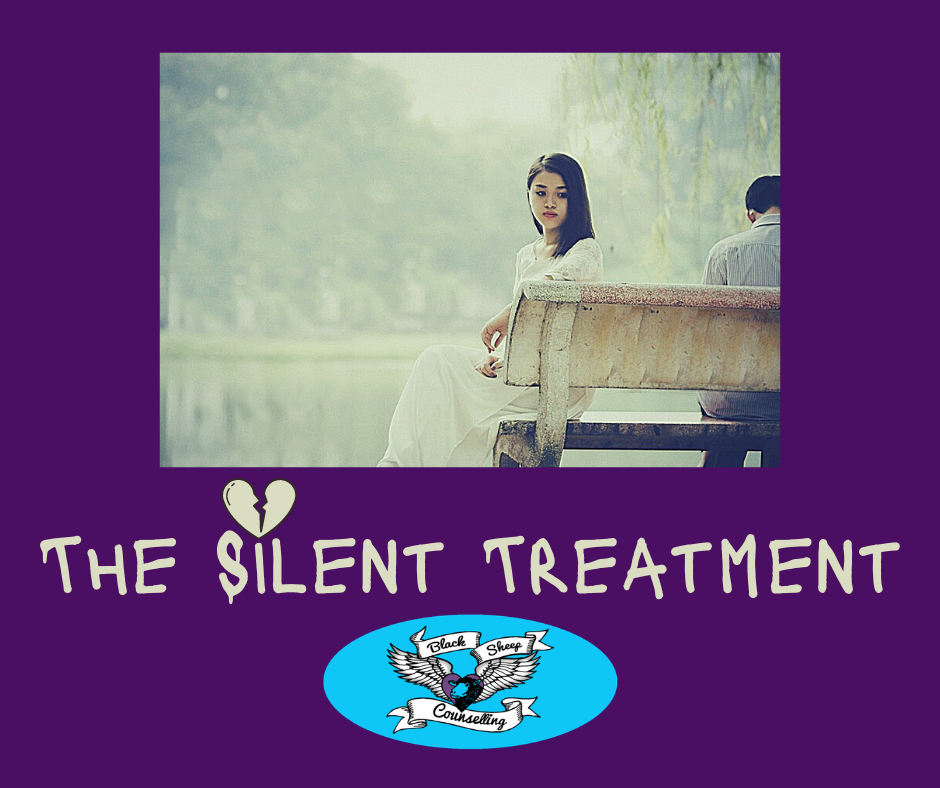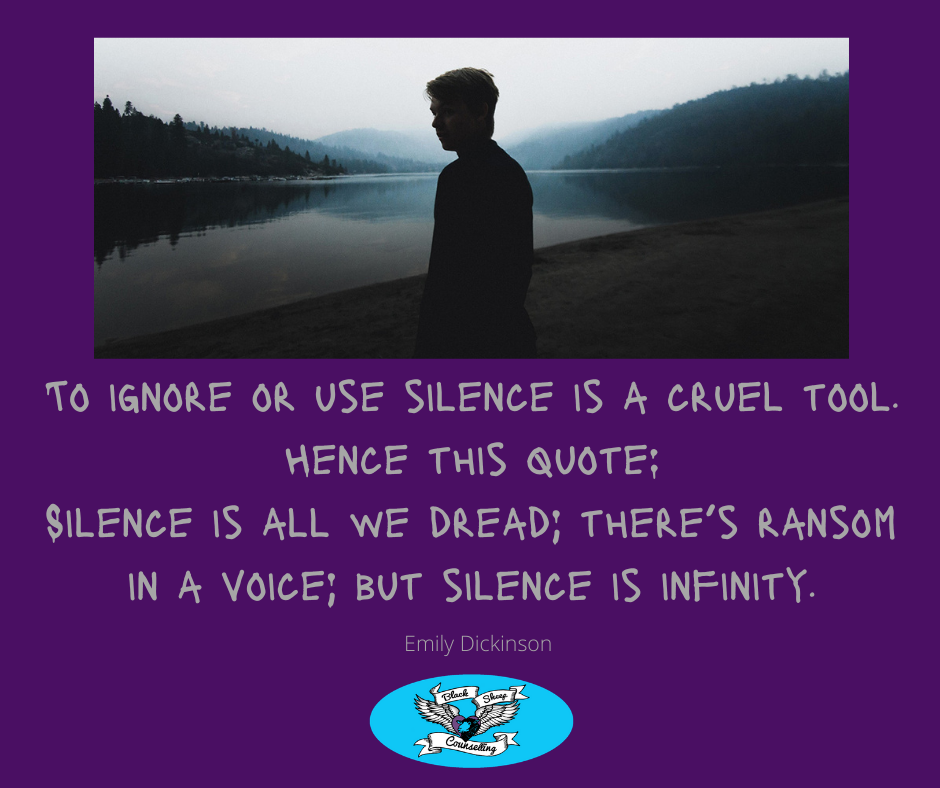The Silent Treatment

The silent treatment is the act of ignoring and excluding a person or group by another person or group. The silent treatment is one of the forms of ostracism that most of us have experienced. In addition to the silent treatment, physical examples of ostracism are having written communication (text, email) not reciprocated, having someone hang up on you in a telephone conversation, being excluded from social gatherings, and “time-outs”. The pervasiveness of ostracism is such that it transcends time and is evident in almost all civilizations and known cultures (Greuter & Masters, 1986).
The ubiquity of ostracism is reflected in the many terms used to describe it: “ghosting”, “icing out”, “the cold shoulder”, “avoiding”, “shunning”, “treat to ignore”, “exile”, “banishment”, “expulsion”, “time out”, and “silencing”. Forms of ostracism are evident throughout institutions in our society such as schools (e.g., time-outs, expulsion) and the workplace (ostracism of whistleblowers by co-workers). Almost all religions punish noncompliance with ecclesiastical law with some form of excommunication, barring the deviate member from the congregation and from any privileges that membership holds in the afterlife, such as ascension to heaven (Faulker, 1998, & Zippelius, 1996, as cited by Williams, 2001).
The silent treatment is commonplace and normalized. When the silent treatment goes on for long periods of time it creates emotional cut-offs in families. My own family has multiple generations of emotional cut-offs on both sides of the family. One of my parents and a sibling did not speak for the last 30+ years of their lives. I inquired many times what this rift was about, and my parent could not tell me anything concrete. I suspect there was no recollection as to the “why”, they simply were entrenched with righteous indignation. I find this sad and unnecessary.
The silent treatment is a form of emotional violence. It is a cruel, dysfunctional, and destructive defense mechanism. It communicates “You’re not worth responding to. Your thoughts and feelings don’t matter to me. You don’t matter to me.” The silent treatment and stonewalling activate feelings of abandonment in the brain. Research indicates that this ostracism activates the anterior cingulate cortex, the same part of the brain that detects physical pain. Ostracism is often the activating event that brings people to seek mental health support, as it threatens one’s fundamental human needs. One’s sense of belonging and connection is severed, one’s sense of personal agency is diminished, self-esteem is shaken by exclusion and gives rise to inferiority and the debilitating emotion of shame. Most would agree that responding to another with physical violence is completely unacceptable behaviour. And yet, the silent treatment activates the very same pain receptors in the brain. John and Julie Gottman are arguably considered the leading experts in couples therapy in the Western world. The Gottmans have been known to predict with 94% accuracy whether couples will get divorced. The Gottman’s research have identified Stonewalling (the silent treatment) as one of The Four Horsemen, the behaviours that predict relationship failure (in case you’re interested, the other 3 are: criticism, contempt, and defensiveness).
When we know better, we can do better…..
Accountability is key. If we can be honest with ourselves, most of us have not just been the victim of the pain of receiving the silent treatment, we have also been the perpetrators of inflicting the silent treatment because it is prevalent, learned behaviour. But we can unlearn such behaviour.
If you feel justified that you are simply treating people the way you yourself have been treated, that is a good indicator that you are in need of doing some personal work. Similarly, if someone shares with you how your words or actions have hurt them and you go into minimizing, denying, or deflecting their reality, you are engaging in a form of emotional abuse called gaslighting (see here for more on this: https://blacksheepcounselling.com/2018/08/gaslighting/). We do not get to decide what another deems hurtful behaviour.
Holding the above beliefs indicate that you have been hurt. Hurt people tend to hurt people. You deserve to have your pain validated. Working with a counsellor can help heal some of that pain. Suffering is universal. I believe that until we can get in touch with our own pain and suffering, it is hard for is to hold space for the pain and suffering of other ~ this is deafening loud in much of society today. Pain is pain. It is part of our shared humanity and it can unite us, rather than cause divisiveness.
When one does their personal work there is a ripple effect: showing up in relationship with respectful communication and asserting healthy boundaries shows others more adaptive ways of being, and thus toxic family patterns are arrested. Therapeutic support can help with increasing distress tolerance and acquiring tools needed to minimize reactivity and cognitive distortions, while increasing physiological self-soothing.
Good Conflict Increases Intimacy: Accepting the 3 R’s (relationship, rupture, repair)
EVERY relationship we are in will incur a rupture of some sort. Misattunements and misunderstandings are inevitable, even in the therapeutic relationship. I find ruptures in my work with clients can be incredibly valuable, as it can offer an opportunity for a successful repair to be executed with a trusted individual (sometimes it might be a client’s very first). For many people, conflict is terrifying because there is a fear of losing intimacy or trust. However, that is exactly what avoiding conflict brings. First off, we cannot change what we don’t acknowledge. How might things change for you if you moved into acceptance that a relational rupture is fated to happen with those we care about? We need not fear it because we can acquire skills to better address it. Good conflict is a learned skill, and like anything you wish to improve upon, you can learn this by reading books, listening to podcasts, following therapist social media pages, engaging in training or therapy, and through actual practice. Avoiding conflict in an attempt to “keep the peace” threatens our paramount need for authenticity*. Over time, avoiding conflict creates feelings of loneliness, resentment, anger, and contempt in us, and feelings of confusion, frustration, isolation, and disconnection in the other person.
So what is the difference between “The Silent Treatment” and “No Contact”?
If you have tried to engage in a repair with someone and they continue to emotionally abuse through tactics like criticism, projection, manipulation, lying, backstabbing, gossiping, bullying, deflecting or minimizing your truth, then it is prudent to initiate a no contact order in an self-protective effort and gift yourself with prioritizing your own recovery. The difference here is intent: you are not focusing on punishing or hurting someone. Your responsibility is to become all you are meant to become; being continually abused impedes your own growth, and can cause you to perpetuate the same hurtful behaviours towards others.
We have a choice how we want to show up in this life. Imagine what impact we could make if we strived to treat others better than the way we were treated.
If you are wishing to move away from destructive patterns or heal from the wounding of ostracism, help is available.

*we need authenticity to experience true belonging – Brene Brown’s research has illuminated that the opposite of belonging is fitting in. Read that again.

Within the worst relational conflict lies the greatest opportunity for growth and intimacy.
John & Julie Gottman
